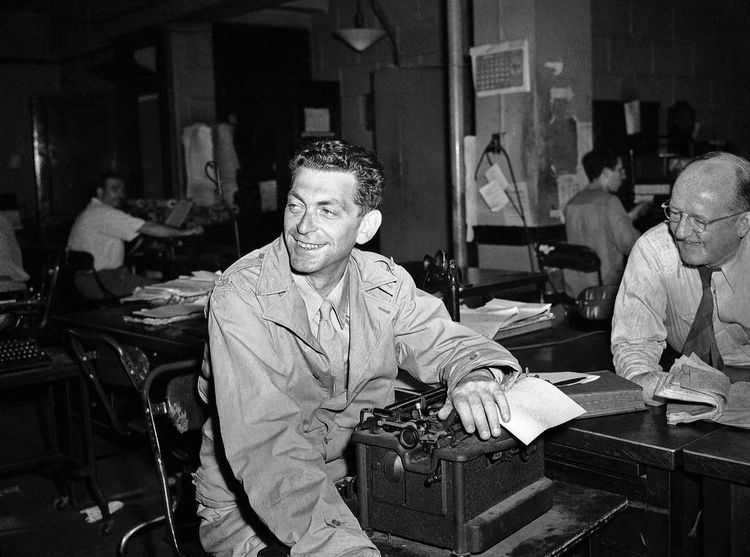He was first to report V-E Day — then he was fired for it

The war reporter from the Associated Press named Ed Kennedy is in Paris. He stated that the war had ended and he will dictate the news. Germany surrendered without any conditions. The former president of the Associated Press, Tom Curley, documented the conversation. The reporter requested that the official date be set as Reims and the news should be sent out immediately.
Using that cable, Edward Kennedy, who was a war correspondent for AP, got a great story he'll never forget about. Nonetheless, he also messed it up.
Kennedy was only able to speak around 200 words before losing connection. However, his news regarding the end of the world's biggest and most violent conflict spread so quickly that inquiries were already coming in from Paris before he got disconnected. The New York Times reported this.
Kennedy was one of the 17 journalists who witnessed the official German surrender in Reims, France on May 7, 1945. Since that was an important event, Kennedy wanted to report it immediately.
The article was not allowed to be released yet and the military officials wanted to keep it a secret for a few hours. When the reporters went back to their hotel, which was Hotel Scribe in Paris, they were told they couldn't publish the article for another 24 hours and no one said why.
Kennedy sarcastically described us as "trained seals" in his book "Ed Kennedy's War: V-E Day, Censorship, & the Associated Press."
Kennedy discovered that the embargo was not imposed due to security concerns, which would have been understandable. Rather, the reason for it was political. As reported in the Washington Post, it was uncovered that the Soviet Union's leader, Joseph Stalin, desired to hold his own signing ceremony to take partial credit for the surrender. American officials were supportive of this notion and aimed to assist him in achieving his moment of fame.
The surrender of the German forces took place in Reims, France on May 7, 1945, as depicted in images from Getty.
Kennedy became upset when he learned that the German high command had announced their surrender from their base in Flensburg, Germany on May 7.
According to reports, he spoke to a clerk at the hotel's censorship office and said that for the past five years, the justification for censorship was to protect men's lives. However, since the war ended and he witnessed the surrender himself, he questioned why the story couldn't be told.
The person responsible for censorship responded that he was not authorized to make public Kennedy's narrative.
"Okay," replied Kennedy firmly. "I want to let you know in advance that I am going to submit it."
When Kennedy phoned the London office of AP, the words he spoke became historic, and the news was quickly transmitted over the wire.
Kennedy faced immediate consequences for his actions. He was deprived of his credentials as a war correspondent and subsequently instructed to return to his home country by the leaders of the Allied forces.
General Dwight D. Eisenhower said that Kennedy was suspended because he admitted to breaking the SHAEF rules on purpose and also broke the trust of his superiors.
The next day, Kennedy's colleagues who were probably envious, made matters worse by condemning his actions with a vote of 54-2. They called it "the most shameful, intentional and unethical betrayal in the history of journalism."
Robert McLean, who is the president of the AP board, released a statement on May 10th expressing deep remorse for the story. The news agency took firm action against Kennedy, suspending him indefinitely. In due course, he was discreetly dismissed from his role at the agency.
Even though the public scolding, the journalist still firmly believed that what he did was the right thing to do.
When he arrived in New York on June 4, Kennedy spoke to some journalists and said he would repeat his actions. He reasoned that since the war was already over and there was no military threat, people deserved to know what happened.
A journalist who witnessed the violent Spanish Civil War firsthand, reported on the happenings in Eastern Europe and the Balkans, covered the North African war and even participated in the Seventh Army's invasion of southern France in 1944, was unexpectedly left unemployed.
The veteran war correspondent Kennedy eventually became a managing editor at the Santa-Barbara News-Press in California, thanks to the compassionate owner who gave him the job. This opportunity, however, was considered a downgrade from his previous career.
In 2012, it was already 67 years since Kennedy made the big announcement of the century. The AP finally released an official statement expressing remorse for what they did.
Curley expressed that it was an extremely negative day for the AP and it was managed in a highly inappropriate manner. Holding back such valuable information after the war was over was not acceptable and the global community required access to it.
Journalists made a request to give a Pulitzer Prize to Kennedy who passed away. They apologized while making this request. Even though Kennedy was nominated for the prize in 2013, he did not win. But, it is possible to resubmit his nomination as per the Pulitzer rules. Many people have been pushing for recognition for Kennedy over the past few years. This was reported by USA Today.
Kennedy passed away in 1963 due to a car accident, hence, he could not witness his exoneration.
In Seaside, California, there is now a memorial in Laguna Grande Park dedicated to Kennedy. The engraving on this monument perfectly captures his legacy: "He gifted the world with one more day of joy."
Claire Barrett holds the position of Strategic Operations Editor at Sightline Media and is also an expert in World War II research. She has a deep admiration for Sir Winston Churchill and is a passionate supporter of Michigan football.









































